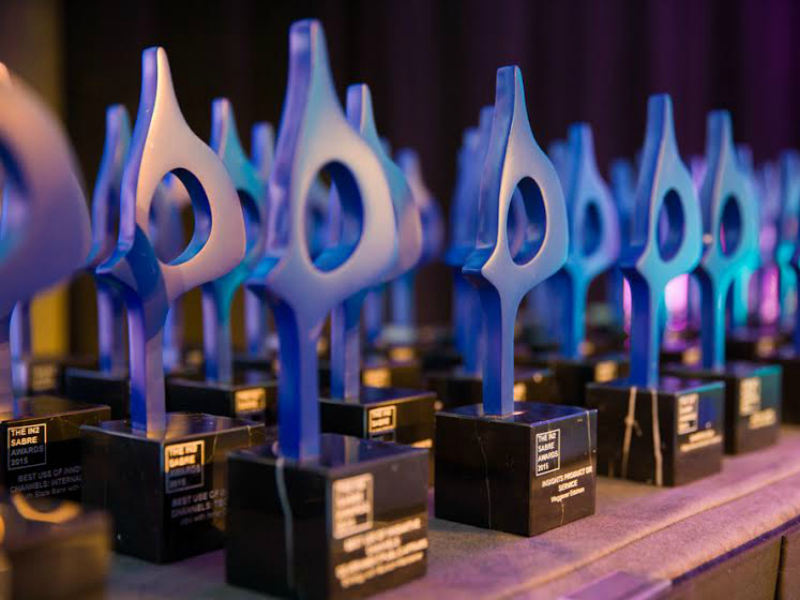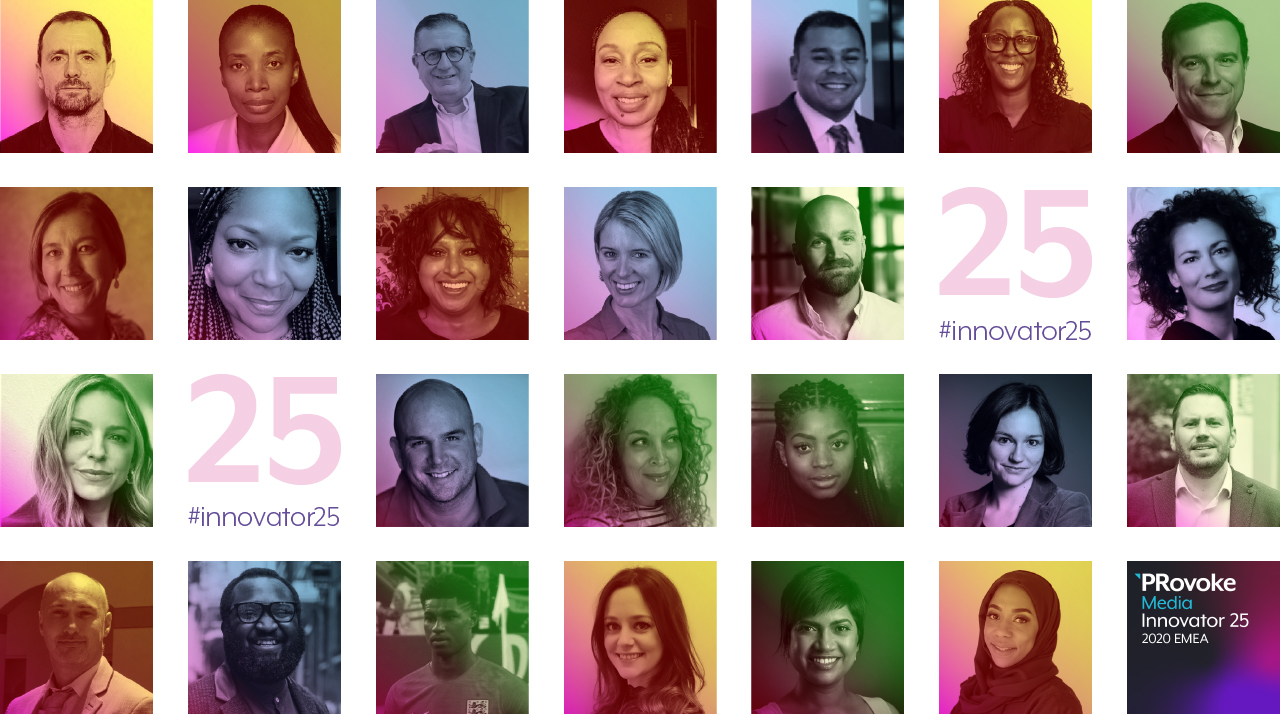
The Innovation SABRE Awards — North America 2020
Showcase your innovation. Don't miss your last chance to enter November 4!

 Podcasts
PodcastsCatch the latest PR news & updates with PRovoke Media's PR Podcasts. Lifting the lid on key industry stories & trends, join our listeners of PR podcasts today.
 Videos
VideosLatest video interviews and campaigns from PRovoke Media, previously known as the Holmes Report.
Long-form journalism that analyzes the issues, challenges and opportunities facing the business and practice of PR.
 Profiles & Interviews
Profiles & InterviewsExplore PR profiles and interviews with leaders from the marketing and PR worlds.
 Crisis Review
Crisis ReviewPR Crisis & Business Crisis review. PRovoke Media's annual analysis of the top reputation crises to rock the corporate sector. Read on here.
 Coronavirus
CoronavirusPRovoke Media's coverage of the Covid-19 crisis, focusing on corporate communication, public affairs & PR industry fallout.
 Trend Forecasts
Trend ForecastsPRovoke Media's PR Trends round up. PRovoke Media's annual forecast of PR trends and news that will impact the PR world in the year ahead...
 Social & Digital
Social & DigitalDedicated to exploring the new frontiers of PR as it dives deeper into social media, content and analytics.
 Technology
TechnologyOur coverage of key technology PR trends and challenges from around the world of digital communications.
 Consumer
ConsumerFrom brand marketing to conscious consumerism, coverage of key marketing and PR trends worldwide.
 Employee Engagement
Employee EngagementPRovoke Media's coverage, analysis and news around the rapidly-shifting area of employee engagement and internal communications.
 Sports Marketing
Sports Marketing Sports PR news, diversity & inclusion trends, views and analysis from PRovoke Media. Subscribe today for the very latest in the world of sports communications.
 Global PR Agency Rankings
Global PR Agency RankingsPRovoke Media's definitive global benchmark of global PR agency size and growth.
Enter PRovoke Media's 2024 Global 250 Agency Ranking and/or our Agencies of the Year competitions now.
 Agencies of the Year
Agencies of the YearPRovoke Media's annual selections for PR Agencies of the Year, across all of the world's major markets.
 Innovator 25
Innovator 25PRovoke Media profiles marcomms innovators from across North America, EMEA and Asia-Pac.
 Creativity in PR
Creativity in PRIn-depth annual research into the PR industry's efforts to raise creative standards.
 Asia-Pacific Communication Index
Asia-Pacific Communication IndexAPACD/Ruder Finn annual study of Asia-Pacific in-house communications professionals.
 SABRE Awards
SABRE AwardsThe world's biggest PR awards programme, dedicated to benchmarking the best PR work from across the globe.
 PRovokeSummit Global
PRovokeSummit GlobalThe biggest PR conference of the year, a high-level forum designed to address the critical issues that matter most.
 PRovoke Media Regional Series
PRovoke Media Regional SeriesA global network of conferences that explore the innovation and disruption that is redefining public relations.
 Agencies of the Year
Agencies of the YearUnrivalled insight into the world's best PR agencies, across specialist and geographic categories.
 Roundtables
RoundtablesOur Roundtables bring together in-house comms leaders with PR firms to examine the future of communications.
 Agency Playbook
Agency PlaybookThe PR industry’s most comprehensive listing of firms from every region and specialty
.jpg) All Jobs
All JobsFind the latest global PR and communications jobs from PRovoke Media. From internships to account executives or directors. See all our PR jobs here.
PRovoke Media's editorial series published in collaboration with partners.

Darryl Sparey’s single-minded focus on ensuring every element of communications strategy and every piece of activity leads directly to solid business outcomes for clients sets him apart in an industry which still too often grapples with effective measurement. Sparey, also unlike many in the comms industry, is a business person with a sales background first, and a PR professional second, which makes him ruthless in planning and measuring work for clients. He is also unafraid of looking beyond PR in solving clients’ business problems or helping them meet their ambitions, carrying out everything from SEO to community management. Spotting an opportunity to innovate by combining sales-led marketing with PR – and injecting a welcome dose of creativity into B2B comms – Sparey’s bravery extends to launching an agency dedicated to this approach in the middle of a pandemic. Hard Numbers, which was founded with creative director Paul Stollery in June, has quickly become one of the most noteworthy of the many ex-Hotwire alumni, immediately picking up clients from early-stage start-ups to established martech and fintech players in pitches against far more established global firms. Sparey started his career in media monitoring, leading an MBO of Media Report and then selling it to Precise (now Kantar) before seguing into digital marketing and new business development with Mediaworks and, latterly, Hotwire.
Where is the most urgent need for innovation within the PR/communications industry?
The approach to attracting, communicating with and bringing in diverse talent from different backgrounds and different experiences. 2020 was definitely the year that, I believe, agency owners realised they needed to stop paying lip-service to this, and start doing something about it.
How would you describe the communications/PR industry's level of innovation compared to other marketing disciplines?
We're lagging behind in our adoption and utilisation of technology, no question, and more broadly across other industries as well. Most agencies haven't adopted and utilised the benefits of CRM technology, for example, or marketing automation platforms to help automate reporting and some parts of the workflow. The communications industry also massively under-indexes on its adoption and utilisation of business intelligence (BI) and analytics platforms like Google Data Studio or PowerBI. Everyone is using Zoom or Teams, Dropbox or Egnyte, Google Docs or Microsoft 365 now, that’s not even table stakes for agencies any more.
How have the events of 2020 impacted innovation in the PR and communications industry?
The events of 2020 have dragged many organisations kicking and screaming towards using 21st century technologies, and using these as a platform for remote collaboration and productivity. Lots of organisations, in-house teams and agencies alike, had a strongly presenteeism-oriented culture before the pandemic. The ones that have thrived and will thrive in the future are the ones who set themselves us to work flexibly, in a hybrid fashion, to allow both remote and in-office work. These are the ones that can be more nimble in managing their fixed costs, and managing their resources in future. And these are the ones that will be able to recruit the best talent globally, not just those who live within a 1 hour commutable distance from the office.
Where is the PR industry's greatest opportunity for taking the lead on innovation?
I'd love to see more agencies take a risk and try and develop and commercialise their own technology and IP. That's definitely an ambition I have for Hard Numbers, and I'd love to see more agencies trying to do that. There are huge opportunities that exist in the repetitive, time-consuming but uninteresting tasks that all agencies do for their clients. Deploying technology that automates this, and frees staff up to do higher value strategic and creative work represents a huge opportunity for everyone, and where the industry is surely headed in the future.
What is the ideal working scenario for innovation?
Organisations that innovate are ones that are willing to take risks, do things differently, embrace optimisation and continuous professional development, and strive for incremental gains in efficiency and effectiveness. And, crucially, if things don't work out, innovative organisations don't have a blame culture, but use failure as an opportunity to learn and improve in future.
Has 2020 changed the way you define/approach innovation? How?
It's not changed the way I approach innovation, but it has given me the opportunity, starting my own agency business, to put into practice a number of innovations and improvements to utilisation of technology in the PR workflow that I've previously not been able to do. It's the benefit of starting with a blank sheet of paper, rather than incrementally innovating in a more established agency.
What is the most innovative comms/marketing initiative you've seen this year?
I think micro-certification, remote learning and continuous professional development are key trends for the future, so Manifest's Incite platform this year was a great initiative that speaks to all of these. I think it's a great tool for the industry, it's a bold move which not many other agencies would have the courage to do, and it's had some great content and speakers.
What is the most important lesson you've learned this year?
I 100% should not have sold my Bitcoin when it got to over $10,000.
Describe a moment in your career that you would consider innovative.
I'm really proud of the Hard Numbers digital PR audit that we launched this year, when we opened the agency. Without giving too much of the game away, it’s a Google Data Studio dashboard, which combines data from Majestic, SEMRush, Opoint and other data sources to give prospective clients a view of the impact that their PR efforts have had on traffic, search engine rankings and other measures. It’s been a great new business tool for the agency, and it's something I developed myself, self-taught on Google Data Studio. There were, admittedly, moments where data formatting between different platforms nearly broke me, but I got there in the end. I think if I can do something like this, anyone can.
Any habit/activity that you have added to your life this year that you hope to take forward post-pandemic?
This has almost nothing to do with communications, but I've joined the growing ranks of PR folks on Peloton this year, and it's been a revelation for me in terms of giving me a regular platform for daily exercise and a reason to do it. I was worried it was going to be the most expensive clothes horse I'd ever bought, but the community aspect of Peloton is really the genius of the product. It keeps people coming back regularly to compete and compare, support and celebrate one another. It's genuinely a brilliantly innovative product, but the real smarts is in the software.
How can the PR industry make real progress in diversity, equity and inclusion (DE&I) and what is the biggest obstacle?
I feel like this year was the year the PR industry really woke up to this, and started trying to do something about it. Initiatives like the Blueprint and PR Fest's Drive pledge are welcome contributions to provide a benchmark and an actionable roadmap to improving diversity and inclusion. Client-side efforts on this front are very welcome too, and there have been some brilliant initiatives from organisations like Lenovo. I think these two kinds of approaches – standards and actionable plans for agencies, and a client-side demand for better visibility of DE&I initiatives – are the things that will continue progress.
What are you thinking about most these days?
When I can get down the pub again.
Your bold prediction for 2021…
2020 is the year that killed predictions!







Intelligence and insight from across the PR world.
About PRovoke Media Contact Us Privacy & Cookie PolicyWe feel that the views of the reader are as important as the views of the writer. Please contact us at [email protected]
Signup For Our Newsletter Media Kits/Editorial Calendar Jobs Postings A-Z News Sitemap© Holmes Report LLC 2024